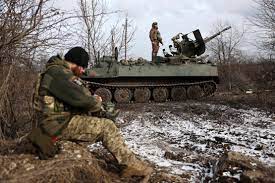Anna Arutunyan
With Switzerland due to play host to a Ukraine peace summit by the summer, Ukrainian President Volodymyr Zelensky is placing high hopes it will “strengthen” his country. But with Russia’s war against Ukraine in its third year, another summit is unlikely to offer a breakthrough – not just because Moscow will not be present, but more importantly because neither side has a clear vision of what a victory now means or how to achieve it.
Much continues to be assumed about Russian President Vladimir Putin’s intentions to fully subjugate Ukraine – but while he’d take it if he could get it, the Kremlin is keeping its objectives as nebulous as they were when it started its “special military operation” two years ago. “There will be peace when we achieve our goals,” Putin said in December, “the denazification and demilitarization of Ukraine, its neutral status.” This means everything and nothing, and can be spun to mean whatever the Kremlin wants.
Western policymakers would be wiser to make judgements about the Kremlin’s intentions based more on its actions than its words. Russia’s war machine, while in a better position than a year ago, is hardly capable of taking Kyiv as it tried to do in the beginning of the war, and since mid-2022 it has focused on territorial gains in the east. After announcing the illegal annexation of Ukraine’s Luhansk, Donetsk, Zaporizhia and Kherson regions in September 2022, Moscow has largely stuck to trying to capture the entirety of those regions. As for what it does if that ever happens, Moscow is signaling a far more aggressive posture to the West than it has the intent or capability to carry out, testing just how much it can get away with.
“The special military operation began as an operation against Ukraine, over time it took the form of a war against the collective West,” Kremlin spokesman Dmitry Peskov said recently. It is doing so in part because the plans and intentions of Ukraine’s Western allies are so vague. Are the US, EU and UK offering Ukraine limited aid to defend its territory (as they seem to be actually doing) or are they indeed waging a proxy war to “defeat” Putin’s Russia (as they seem to be saying)?
Just as the Kremlin is doing, Ukraine’s Western allies are signaling their resolve to “defeat” Russia without actually articulating what that defeat means. Far from keeping the Kremlin on its toes, this strategic ambiguity actually makes Western powers look weak from Moscow’s vantage point – overpromising to compensate for a lack of political will. This became glaringly obvious at the Munich Security Conference, where one policymaker’s description summed up the substance of the West’s Ukraine strategy: “Lots of words, no concrete commitments.”
One reason for this is that over the last year, Ukraine’s stated goal of victory – recapturing all the occupied Ukrainian territories, including Crimea, under Russian control for nearly a decade now – looks increasingly unrealistic. The military support Ukraine’s allies are willing and capable of offering stops precisely where Ukraine’s most pressing shortages lie: manpower. Despite French President Emmanuel Macron’s recent grandstanding comments about “not excluding” sending troops to Ukraine, NATO powers are not seriously considering this destructive and escalatory step, and rightly so.
But in Ukraine, the issue still stands. “The most immediate problem in every unit is lack of people,” a Ukrainian company commander said recently, echoing mounting recognition on Ukraine’s front lines of just how dire the problem has become. Indeed, Zelensky sacked his commander in chief, Valerii Zaluzhnyi, last month amid controversy over the suggestions that up to 500,000 more soldiers might be needed if Ukraine’s goals were to be achieved. The proposal was both financially and politically unfeasible, so Zelensky dismissed the general and launched a “reset” of the military command, but without either expanding the army or scaling down his goals.
There is another problem: It’s one thing to push Russian forces back to their positions before February 24, 2024 – however difficult that may be two years into the war – but it’s quite another to dislodge de facto Russian administrations from territories in Donetsk, Luhansk and Crimea that they have occupied for a decade. But Ukraine’s Western allies are failing to reckon with these realities and, amid growing reluctance by right-wing parties in the US and Europe to shoulder the costs, are resorting instead to triumphalist rhetoric.
A recent white paper from the Estonian Ministry of Defense pledged to “defeat Russia’s imperialist theory of victory” but failed to define exactly what that entailed. Allies of former US President Donald Trump who oppose the aid package that has stalled in the US Congress may be wrong to think that $60 billion won’t “change the reality on the battlefield” – more weapons can and will help Ukraine hold their defense and perhaps regain more territory. But it will hardly guarantee the “fate of the free world” or “save democracy as we know it” as some US lawmakers claimed in supporting the bill.
The trouble is, while more weapons and aid will help Ukraine defend itself, there can be no guarantees that a country of some 37 million people can ultimately defeat an adversary of more than 140 million. Airily suggesting that this is inevitable misleads Ukraine, sows mistrust among Western taxpayers, and signals weakness to Russia. Although there is scope to tighten the sanctions already in place, they will not force some rapid change in Kremlin policy, and as Western countries begin to run down their own stocks of weapons and ammunition, there is also a limit to how much extra military aid can be provided.
Law and justice may say that Ukraine deserves to liberate the occupied territories, but pragmatism suggests this may be a bloody or even unachievable goal. Western allies need to start recognizing their limited resources, or at least the limits to what they can or will offer Ukraine. This will mean being honest about defining what can practically be achieved. It is all very well declaring that the only acceptable goal is Putin’s absolute “defeat.” But when political and economic constraints limit the resources the West is prepared to deploy, continuing to insist on it may well back Kyiv into a corner, forcing it to choose between peace and a forever war in pursuit of an unclear notion of “victory.’
However unpalatable and unfair, the best plausible victory may require not just amped-up military support for Ukraine, including serious security guarantees, but some recognition that Kyiv may have to abandon some of its goals, whether through promises of neutrality – or, as hard a pill as this is to swallow – some of the occupied territories.







